Location, Location, Location! Or Maybe Not![Over]  By Benyamin POGHOSYAN, PhD, Chairman, Center for Political and Economic Strategic Studies By Benyamin POGHOSYAN, PhD, Chairman, Center for Political and Economic Strategic Studies
It may appear that the primary obstacle to the signature of a peace treaty between Armenia and Azerbaijan is the different views of the sides on where to resume and finalize the process. Armenia wants to do that in Western platforms, while Azerbaijan wants to return to the Russian platform, use the 3+2 format, or have direct negotiations without any mediators. In reality, the roots of the current situation are more profound than simple geopolitical choices of venue.”
The military takeover of the self–proclaimed Nagorno Karabakh Republic by Azerbaijan has raised hopes that it may facilitate the signature of the peace agreement between Armenia and Azerbaijan. The logic behind this thinking was clear – the future of Nagorno Karabakh, and the fate of the Armenians living were the primary obstacles on the road toward peace. As all Armenians were forced to leave the region, and NKR de facto president Samvel Shahramanyan signed a decree about the dissolution of the republic by the end of 2023, it seemed that the stage was set for quick signature of the Armenia – Azerbaijan peace treaty, and then a push forward in the Armenia – Turkey normalization process.
READ MORE
Turkey Supports Azerbaijan’s Operation in Karabakh[Over]
 By Fuad SHAHBAZOV, Baku-based independent regional security and defence analyst By Fuad SHAHBAZOV, Baku-based independent regional security and defence analyst
On September 19, Azerbaijan launched an “anti-terrorist operation” in the Karabakh region against armed separatist forces. The operation followed three years of largely unproductive peace talks between Armenian and Azerbaijan following the Second Karabakh War in 2020. The clashes ended in a ceasefire after only one day due to the separatist regime’s limited military-technical capacity in resisting the well-equipped Azerbaijani Armed Forces.
Baku’s allies were quick to applaud the move. For example, Turkish President Recep Tayyip Erdogan, during a joint news conference with Azerbaijani President Ilham Aliyev, declared, “It is a matter of pride that the operation was successfully completed in a short period of time, with utmost sensitivity to the rights of civilians”. Turkey has traditionally been a staunch ally of Azerbaijan, and the recent military operation to reclaim Karabakh plays into Ankara’s regional interests, especially regarding the future development and opening of the Zangezur Corridor.
READ MORE
- November 28, 2023 07:40AM
Armenian Cultural Heritage in Nagorno-Karabakh Should Be Protected[Over]  By Benyamin POGHOSYAN, PhD, Chairman, Center for Political and Economic Strategic Studies By Benyamin POGHOSYAN, PhD, Chairman, Center for Political and Economic Strategic Studies
The lightning offensive of Azerbaijan against the self-declared Nagorno Karabakh Republic launched on September 19 has significantly changed the regional security architecture, which emerged after the 2020 Nagorno Karabakh war. Within 24 hours, Azerbaijan forced the unrecognized Republic to surrender, followed by the forced displacement of the entire Armenian population. As of early October 2023, around 102000 Armenians entered Armenia from Nagorno Karabakh, while, according to various estimates, from 15 to several hundred Armenians remained in the area. This new status quo raises many questions regarding the future of the Russian peacekeeping contingent in the area, the prospects of the Armenia – Azerbaijan peace treaty, and the fate of Armenians from Karabakh, including such issues as the right of return and property compensation
READ MORE
US-Turkey Relations: Biden Navigates Difficulties with Erdogan[Over] 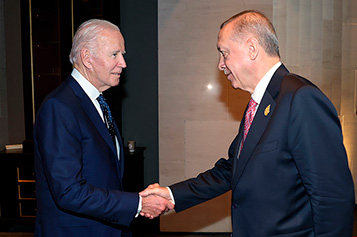 By Eugene KOGAN, Tbilisi-based defence and security expert By Eugene KOGAN, Tbilisi-based defence and security expert
Since the inauguration of President Biden in January 2021, the US administration has kept its relationship with Turkey to a bare minimum. For the Biden administration, the issue of human rights in Turkey remains very much on the agenda while for President Erdoğan, the issue seems to be a lower priority for his administration. Such behaviour infuriates not just Biden administration officials but also members of the House and the Senate. This has resulted in the Turkish president not being invited to Washington. Perhaps the two sides can each be blamed for their current relationship; however, Erdoğan is maintaining his course and appears unbothered by the consequences. For his part, Biden is keeping his cool despite a number of divergences in interests of the US and Turkey. READ MORE
Iran Policy in the Context of Armenia – Azerbaijan Peace Negotiations[Over]  By Benyamin POGHOSYAN, PhD, Chairman, Center for Political and Economic Strategic Studies By Benyamin POGHOSYAN, PhD, Chairman, Center for Political and Economic Strategic Studies
As Armenia and Azerbaijan come closer to signing an agreement by the end of 2023, and competition grows between Russia and the West to lead the process and take the prize of the main pacifier, other regional actors take steps to clarify their positions. In this context, Iran stands out as one of the primary buffers against the growing role of the West in the South Caucasus.
Being engaged with the US in continuing negotiations to revive the 2015 nuclear deal in full or at least partly, Iran is simultaneously concerned by the US efforts to reduce Russian influence in the South Caucasus. This is not because Iran loves or trusts Russia but because Iran understands the dangers of being encircled by the US, including from the north. Moreover, for Iran, US influence does not mean US military bases or US direct investments.
READ MORE
Iran and Saudi Arabia in SCO: A Strategic Shift in Gulf Alliances[Over]
 By Fuad SHAHBAZOV, Baku-based independent regional security and defence analyst By Fuad SHAHBAZOV, Baku-based independent regional security and defence analyst
Despite international pressure and sanctions, Iran has leveraged its strategic alliances with Russia and China to secure membership in the SCO, providing an additional platform to mitigate isolation and strengthen ties. This development, coupled with the potential inclusion of Saudi Arabia following its diplomatic normalization with Iran, signifies a strategic shift in Eurasian alliances with broader implications for global geopolitics and the balance of power.
On July 4, 2023, the Shanghai Cooperation Organization (SCO) leaders held a virtual summit focusing on multipolarity and territorial sovereignty. A significant summit highlight was Iran’s induction into the organization after months of negotiations. Iran had been keen to join the SCO despite escalating international pressure and sanctions due to its failure to finalize a new nuclear deal and its open alignment with Russia during the Ukraine invasion. Although not officially involved in the military offensive, Iran supported Russia by providing indigenously manufactured Shaheed loitering munitions known as kamikaze drones.
Iran’s support for Russia arrived at a pivotal time, considering Russia’s tactical setbacks in Ukraine. However, this assistance placed Tehran under increased strain from Western powers, significantly impacting ongoing nuclear negotiations. Despite this, the strong partnership between Moscow and Tehran facilitated Iran’s full membership in the SCO.
READ MORE
How Will Hakan Fidan’s Appointment Shift Turkish Diplomacy?[Over]
 By Fuad SHAHBAZOV, Baku-based independent regional security and defence analyst By Fuad SHAHBAZOV, Baku-based independent regional security and defence analyst
After winning re-election, Turkish President Recep Tayyip Erdogan significantly reshuffled his ministerial cabinet. Unlike in previous terms, this time, Erdogan decided to make significant changes to his cabinet while signaling upcoming reforms amid economic difficulties at home and political disputes abroad. In addressing domestic needs, the Turkish president appointed internationally respected ex-banker Mehmet Şimşek as the new minister of finance and Cevdet Yilmaz, former minister of development and deputy prime minister in charge of the economy, as vice president. Although the cabinet members are newly appointed bureaucrats, they are not completely “new faces” as they were heavily engaged in Turkish politics before their appointments. READ MORE
Voices from the Saint Petersburg International Economic Forum 2023[Over]  By Yeghia TASHJIAN, Beirut-based regional analyst and researcher, columnist, "The Armenian Weekly” By Yeghia TASHJIAN, Beirut-based regional analyst and researcher, columnist, "The Armenian Weekly”
I had the opportunity to participate in a program organized by the “Friends for Leadership” to attend the 2023 Saint Petersburg International Economic Forum. Thousands of delegates mostly from Latin America, Africa, and Asia attended the forum alongside heads of state, diplomats, and businessmen. Interestingly, the UAE had the “special guest” status and anyone could feel its cultural, economic, and political presence in the forum. Delegates were anxious to be informed of the details of the new agreements signed between Russia and other countries, Russia’s President Vladimir Putin’s remarks and attend dozens of sessions and panels related to the BRICS, Eurasian Economic Union (EAEU), International North-South Transport Corridor, and North-South trade. I had the opportunity to closely identify Russia’s post-Ukraine war foreign policy priorities, its geo-economic interests in the Middle East, and the challenges of the emerging multipolar world system.
READ MORE
Russia, INSTC and Regional Trade Interconnectivity[Over]  By Yeghia TASHJIAN, Beirut-based regional analyst and researcher, columnist, "The Armenian Weekly” By Yeghia TASHJIAN, Beirut-based regional analyst and researcher, columnist, "The Armenian Weekly”
The International North-South Transport Corridor (INSTC), a 7,200 kilometre model of ship network, rail and road project, was initiated in 2000 by Russia, Iran and India to facilitate trade between India, Russia and Europe. Azerbaijan, Armenia and other countries joined the initiative in 2005. This transport corridor aims to reduce the delivery time of cargo from India to Russia and Northern Europe to the Persian Gulf and beyond. Compared to the sea route via the Suez Canal, this route’s distance shrinks by more than half, which brings the term and cost of transportation down. If the present delivery time on this route is over six weeks, it is expected to decrease to three weeks through this corridor.
In my March 2021 analysis “Armenia and India’s Vision of ‘North-South Corridor’: A Strategy or a ‘Pipe Dream?’” I warned that Armenia’s inability to play an active transit role between Russia/Europe and Iran/India will isolate the republic from regional trade. Between 2005-2018, Armenia did little to finalize the north-south strategic highway connecting its northern border to the southern border, mainly due to public corruption and carelessness.
READ MORE
What Next after Erdogan’s Victory? [Over]  By Benyamin POGHOSYAN, PhD, Chairman, Center for Political and Economic Strategic Studies By Benyamin POGHOSYAN, PhD, Chairman, Center for Political and Economic Strategic Studies
The presidential and parliamentary elections in Turkey were perhaps the most anticipated political events of 2023. There was a feeling among politicians, experts, and academicians that the 21-year rule of Erdogan may end. Given the transition of the global order, the Russia–West confrontation, and the prominent role of Turkey in shaping the balance of power in multiple regions stretching from the Middle East to Central Asia and the Eastern Mediterranean, the foreign policy choices of Turkey are of utmost importance for all global actors.
Erdogan’s efforts to pull Turkey out from its usual role of junior partner of the US and transform the country into an independent regional player has significantly deteriorated Turkey – West relations. The US support to Kurdish forces in northeastern Syria, the purchase of Russian S-400 air defense systems, the suspicions in Turkey about potential American involvement in the July 2016 botched military coup attempt, rejection of Turkey’s request to extradite Fethullah Gülen, and Turkey’s reluctance to agree to the NATO membership of Sweden and Finland, brought US–Turkey relations to their lowest point since the end of the Cold War. Turkey’s position on the Russia – Ukraine war also did not fully satisfy the Americans. Turkey supports Ukraine economically and militarily, but Turkey rejects calls to decrease its economic relationship with Russia, while playing a crucial role simultaneously in organizing exports to Russia.
READ MORE
Israel and Azerbaijan: Trusted Friends and Reliable Partners[Over] 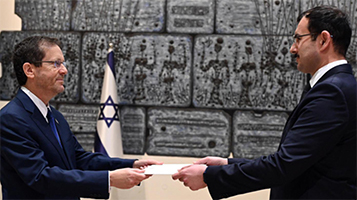 By Eugene KOGAN, Tbilisi-based defence and security expert By Eugene KOGAN, Tbilisi-based defence and security expert
Israeli-Azerbaijani relations are based on two main pillars: patient and cordial political relations as well as defence cooperation and arms sales. While the former reached a more intensive level this year, with the opening of an Azerbaijani embassy in Tel Aviv in late March, the latter pillar of the relationship was well developed long before, as Israel became Azerbaijan’s largest weapons supplier.
After decades of keeping a low diplomatic profile vis-à-vis Israel, in November 2022 the Azerbaijani parliament approved a bill on opening an embassy in Tel Aviv. This was a historic decision as, until then, Azerbaijan had consistently rejected Israeli overtures to send a permanent ambassador, despite the opening of an Israeli embassy in Baku in August 1993. It took almost 30 years for Azerbaijan to reciprocate since the country’s leadership did not want to alienate other Muslim-majority states or provoke the Iranian authorities, who blamed Israel for worsening relations along the Baku-Tehran axis. However, in the wake of the 2020 signing of the Abraham Accords on diplomatic normalization between Israel and Bahrain, Morocco, Sudan, and the United Arab Emirates, followed by the exchange of Israeli and Turkish ambassadors two years later, Azerbaijan’s President Ilham Aliyev felt that the time was right to follow suit. READ MORE
Geopolitical Choices of Armenia amidst the Transformation of Post-Cold War Global Order[Over]  By Benyamin POGHOSYAN, PhD, Chairman, Center for Political and Economic Strategic Studies By Benyamin POGHOSYAN, PhD, Chairman, Center for Political and Economic Strategic Studies
The end of the Cold War and the collapse of the Soviet Union have ushered in hopes of humanity's happy and harmonious future. The ideas such as "End of history" (Fukuyama, 1992) became very popular both within academic circles and policymakers. There was a widespread belief that the entire planet would live under liberal democracy, and interstate conflicts will become bad memories from history. The last decade of the 20thcentury seemed to confirm those hopes. The EU and NATO enlargement, market reforms informer socialist states, cooperative relations between Russia and the West, and the growing US –China economic cooperation have seemingly justified hopes for establishing the world united under the banner of liberal democracy. READ MORE
A Political DEPREM? The Impact of the Earthquake on Turkiye’s Domestic Politics[Over]  By Yeghia TASHJIAN, Beirut-based regional analyst and researcher, columnist, "The Armenian Weekly” By Yeghia TASHJIAN, Beirut-based regional analyst and researcher, columnist, "The Armenian Weekly”
2023 marks the centennial of the establishment of the Republic of Turkey, when the Turkish Grand National Assembly led by Mustafa Kemal Atatürk proclaimed the establishment of the republic and the abolishment of the Caliphate that ruled Ottoman Turks for six centuries. For decades, the Kemalists and military-backed governments ruled Türkiye with a secular iron hand. It wasn’t until 2002, when the conservative Justice and Development Party (AKP) came to power that Kemalists’ monopoly on power was challenged, ending decades of unstable coalition governments. AKP’s early years were relatively peaceful, as the country experienced fast economic growth and continued openness to the West. However, as the authorities began facing domestic and regional challenges, illiberal democracy started to consolidate itself in Türkiye. In 2013, protests erupted in opposition to building a shopping mall in Istanbul’s Gezi Park. The government violently cracked down on the movement and began limiting civil liberties and curtailing press freedoms. Moreover, a failed coup attempt in 2016 consolidated authoritarianism in the country.
READ MORE
Azerbaijan’s Efforts to Digitalize the Middle Corridor[Over] 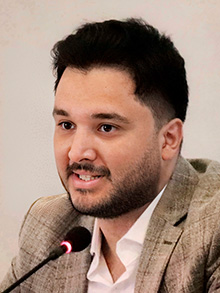 By Vusal GULIYEV, Visiting Research Fellow at the Asian Studies Center of Boğaziçi University By Vusal GULIYEV, Visiting Research Fellow at the Asian Studies Center of Boğaziçi University
Located at a key geopolitical and geo-economic point in the Silk Road region, Azerbaijan has been a main initiator in the development of technologically advanced and economically viable trans-border logistics and transit services. This is largely due to Baku’s embrace of a wide spectrum of digitalization and innovation initiatives within the broad-based connectivity framework of the Middle Corridor Initiative (MCI) and other similar such projects. This IDD analytical policy brief will examine various aspects of this important topic as it relates to MCI.
Seizing new opportunities in the digital era whilst developing better measures to boost the digital economy and trade with embedded innovation and emerging technologies has become one of Azerbaijan’s top priorities in the past few years. In the wake of significant government-backed digital transformation efforts, special attention is now being placed on enhancing the variety of logistics services on offer, building cutting-edge infrastructure, and upgrading domestic communication systems.
READ MORE
Prospects for Armenia-Turkey Normalization[Over]  By Benyamin POGHOSYAN, PhD, Chairman, Center for Political and Economic Strategic Studies By Benyamin POGHOSYAN, PhD, Chairman, Center for Political and Economic Strategic Studies
The devastating earthquake in Turkey, and Armenia's decision to provide humanitarian assistance and send rescue teams, have however opened a new window of opportunity for revitalizing the stalled [normalization] process". "Turkey assessed the Armenian government's gesture positively, and the Armenian foreign minister's visit to Turkey made it possible to advance the implementation of agreements reached in 2022. And yet, "earthquake diplomacy" will not lead to short-term breakthroughs in bilateral relations.
Devastating earthquakes of 7.8 and 7.5 magnitudes struck southern Turkey on 6 February 2023. By 10 April, the death toll had passed 50,000, while the number of wounded passed 100,000. More than 12,000 buildings were destroyed, and large-scale rescue operations were underway. Besides the immense human tragedy, the earthquake had domestic and foreign policy implications for Turkey. The country faces crucial presidential and parliamentary elections scheduled for 14 May. READ MORE
The Political Future of the Armenian Community in a Fractured Lebanon[Over]  By Yeghia TASHJIAN, Beirut-based regional analyst and researcher, columnist, "The Armenian Weekly” By Yeghia TASHJIAN, Beirut-based regional analyst and researcher, columnist, "The Armenian Weekly”
Armenians in Lebanon are a deeply institutionalized and politicized community. Given its transnational nature, the community is affected by international, regional, and local developments. For this reason, the political parties and the community leadership analyse local events and position themselves in the Lebanese political space based on local, regional, and sometimes pan-Armenian calculations or interests. Hence the community, like other transnational ethno-religious groups, absorbs from its surroundings and reacts accordingly to preserve itself from security threats. […] This policy brief will also raise a few recommendations regarding new strategies and the need to adopt a vision for the future of the community amid the wave of uncertainties surrounding Lebanon.
READ MORE
The Transformation of the World Order[Over]  By Benyamin POGHOSYAN, PhD, Chairman, Center for Political and Economic Strategic Studies By Benyamin POGHOSYAN, PhD, Chairman, Center for Political and Economic Strategic Studies
The 2007-2008 world financial crisis triggered discussions about the inevitable decline of the post-Cold War unipolar order, marked by absolute US hegemony. The Arab Spring, the 2014 Ukraine crisis, the Syrian civil war, and the botched US withdrawal from Afghanistan in 2021 contributed to the ongoing debate about the relative decline of the US and the rise of other powers. The growing influence of non-Western institutions, such as the association of Brazil, Russia, India, China and South Africa (BRICS) and the Shanghai Cooperation Organization (SCO), attempts to abandon the US dollar in bilateral trade, and the establishment of alternative international financial institutions, such as the New Development Bank of BRICS and the Asian Infrastructure Investment Bank, seemed to shatter the undisputed leadership of Western political and financial institutions and the role of the US dollar as the only global reserve currency. The growing economic and military strength of China, the more assertive foreign policy of Russia, and India’s balanced foreign policy seeking to pursue cooperative relations with the West and Russia were signs of the changing nature of international relations. READ MORE
The Georgian Perspective on Geopolitical Changes in the Caucasus[Over] 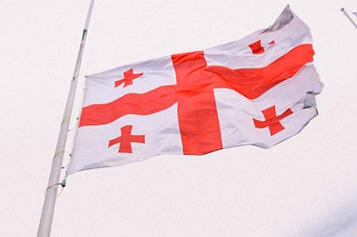 By Eugene KOGAN, Tbilisi-based defence and security expert By Eugene KOGAN, Tbilisi-based defence and security expert
Georgia borders Armenia, Azerbaijan, Russia, and Turkey. It remains a transit hub for oil and gas pipelines originating in Azerbaijan and a road hub for goods coming from Iran via Armenia to the European Union (EU), from Armenia and travelling to Russia, and from Turkey and travelling to Russia and Azerbaijan. As a result, changes that are taking place in the Caucasus due to the Russian war against Ukraine are directly affecting Georgia. Russia as a gatekeeper in the South Caucasus is less able to defend its interests in the region and that results in the ongoing skirmishes between Armenia and Azerbaijan, Iranian military exercises on the border with Azerbaijan, and reciprocal Azerbaijani-Turkish exercises. Thus far, Georgia has kept itself out of the conflict and has even tried to play the role of mediator in the conflict between Armenia and Azerbaijan, but to no avail, since Georgia is not considered a powerful enough conflict mediator. READ MORE
The Draft Law on Foreign Agents Contradicted Georgia’s European Aspirations[Over]  By Nika CHITADZE, PhD, Director of the Center for International Studies, Tbilisi By Nika CHITADZE, PhD, Director of the Center for International Studies, Tbilisi
At the beginning of March 2023, the Parliament of Georgia discussed and supported by the first hearing (with 76 votes) two draft laws regarding the “agents of foreign influence”. The discussion took place against the background of fierce protests both inside and outside the Parliament building. The bills were submitted by the political party “People’s Power”, which is a satellite of the Georgian Dream ruling party. Initially, the draft law “On transparency of foreign influence” was registered in the Parliament. To “ensure transparency”, the new law required the registration of non-entrepreneurial (non-commercial) legal entities and media means which received more than 20% of their income from abroad as “agents of foreign influence”.
READ MORE
Uzbekistan’s April 30 Constitutional Referendum Is Set To Deliver Results[Over] 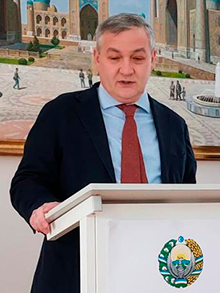 By Ambassador Dilyor KHAKIMOV, Ambassador of the Republic of Uzbekistan in Belgium By Ambassador Dilyor KHAKIMOV, Ambassador of the Republic of Uzbekistan in Belgium
Over the past year, under the leadership of President Shavkat Mirziyoyev, Uzbekistan has embarked upon a national dialogue. Input, feedback, and affirmations from tens of thousands of Uzbek citizens have guided the drafting of a revised Constitution. In recent days, a flurry of activity has occurred that may soon make this draft official and usher in a fresh era for our country as we build a “New Uzbekistan.” Last week, the draft Constitution was considered in the Legislative Chamber and was approved for submission to a referendum on April 30. Then, on Monday, March 13, the Constitutional Court of Uzbekistan ruled that the decision by the Legislative Chamber to hold a referendum was in constitutional compliance. Finally, the Senate, just yesterday, March 14, confirmed this decision and approved the draft for submission to a constitutional referendum that will take place on April 30. READ MORE.
Will the Earthquake Threaten Erdogan’s Rule?[Over]  By Yeghia TASHJIAN, Beirut-based regional analyst and researcher, columnist, "The Armenian Weekly” By Yeghia TASHJIAN, Beirut-based regional analyst and researcher, columnist, "The Armenian Weekly”
On February 6, 2023, two earthquakes with magnitudes 7.8 and 7.5—the deadliest in Turkey’s history—hit the Syrian-Turkish border. At least 45,000 people died in Turkey. Another 6,000 lives were lost in Syria. The fallout of the catastrophic earthquake came as President Erdogan faces his toughest re-election campaign yet. Despite speculation that Erdogan may postpone the elections, he declared that presidential and parliamentary elections will be held on the agreed-upon date, May 14 of this year.
Turkey is a central power in the Middle East. After the 2020 war in Nagorno-Karabakh, its influence increased in the South Caucasus. Thus, any political shift will have an impact on the political landscape of the region. The Turkish President is known for exploiting crises; how he will be able to manage this current crisis and use it to his advantage is still questionable. This article will analyse the impact of the earthquake on Turkey’s domestic politics amid the upcoming presidential and parliamentary elections as Turkey prepares to celebrate the centennial of its foundation as a republic in October 2023.
READ MORE
Baku-Tbilisi-Kars Railway: An Example of “Matching Model Relations”[Over]  By Nuray Alekberli, Researcher, Strategic Studies Consulting Company, Baku By Nuray Alekberli, Researcher, Strategic Studies Consulting Company, Baku
In August 2022, Azerbaijan, Turkey and Georgia have signed an "Agreement amongst three countries on preliminary information exchange for the facilitation of transit customs procedures within the framework of the Baku-Tbilisi-Kars (BTK) railway project" (az.trend.az, 19 August). This agreement aimed at simplifying customs procedures and accelerating border crossing procedures within the framework of the BTK railway project through organizing an electronic exchange of initial information about goods (report.az, 18 August 2022). Therefore, somehow it plays the role of a new breath from a technical point of view to remove obstacles and speed up trade and economic relations between Asian markets and Europe. READ MORE.
Beyond the Blocking of the Lachin Corridor[Over]  By Yeghia TASHJIAN, Beirut-based regional analyst and researcher, columnist, "The Armenian Weekly” By Yeghia TASHJIAN, Beirut-based regional analyst and researcher, columnist, "The Armenian Weekly”
On December 12, under the pretext of environmentalism, dozens of Azerbaijani state-backed “eco-activists” blocked the only land corridor in the Stepanakert-Shushi section connecting Armenia to Nagorno-Karabakh. As anticipated, the “environmental” slogans were soon politicized, and political demands were raised by enforcing a blockade. A humanitarian disaster was created for the 120,000 Armenians living in Nagorno-Karabakh. The real question is why Azerbaijan went for such a provocation and at what risk? Hence, in this article, I will shed light on the current crisis based on my meetings with Azerbaijani experts (keeping their identities anonymous) on the sidelines of several international conferences and online interviews I have conducted to analyze the Azerbaijani perspective and highlight the threats, arguing that the current humanitarian crisis is much deeper than the conflict in Nagorno-Karabakh, and it is related with the “battle of corridors” and beyond. READ MORE
Will Earthquake Diplomacy Change Armenia-Turkey Relations?[Over]  By Benyamin POGHOSYAN, PhD, Chairman, Center for Political and Economic Strategic Studies By Benyamin POGHOSYAN, PhD, Chairman, Center for Political and Economic Strategic Studies
The devastating earthquakes of 7.8 and 7.5 magnitudes struck southern Turkey on February 6, 2023. As of February 12, the death toll passed 30,000, while the number of wounded reached almost 100,000. More than 12,000 buildings were destroyed, and large-scale rescue operations are underway. Besides the immense human tragedy, the earthquake will have domestic and foreign policy implications for Turkey. The country faces crucial presidential and parliamentary elections scheduled for May 14. After the earthquake, discussions started about possibly postponing the elections, given the scale of destruction.
Turkey’s authorities have declared a three-month emergency in provinces affected by the earthquake. Many wonder about the possibility of pursuing an election campaign in the current circumstances. According to Turkey’s constitution, elections should occur by June 18, 2023. Only the start of a war gives authorities a legal option to postpone elections for one year. However, some experts argue that the government may apply to the Constitutional court asking for a one-year postponement claiming that the current emergency equals the launch of military activities. READ MORE
- February 25, 2023 07:42AM
The Closure of the Lachin Corridor Is in No One's Interest[Over]  By Benyamin POGHOSYAN, PhD, Chairman, Center for Political and Economic Strategic Studies By Benyamin POGHOSYAN, PhD, Chairman, Center for Political and Economic Strategic Studies
Azerbaijan has closed the Lachin corridor since December 12, 2022. There are different interpretations of why Azerbaijan did it, and why Baku continues the blockade despite calls from the international community to change its course. Azerbaijan, Armenia, Russia, and the West, in one way or another, all suffer from the blockade. Ultimately, it is up to the Azerbaijani leadership to decide to re-open the road.
Azerbaijan has closed the Lachin corridor since December 12, 2022. Azerbaijani official rhetoric rejects the very existence of a blockade, sometimes claiming that the road is open for humanitarian cargo, and sometimes saying that it was the Russian troops that closed the corridor. The official line from Azerbaijan is the narrative that those blocking the corridor are "independent eco-activists exercising their civil rights to protest." However, the situation is apparent to anyone with a basic understanding of the Nagorno Karabakh conflict – Azerbaijan imposed a blockade on the self-proclaimed Nagorno Karabakh Republic. READ MORE
- February 16, 2023 11:45AM
|
|